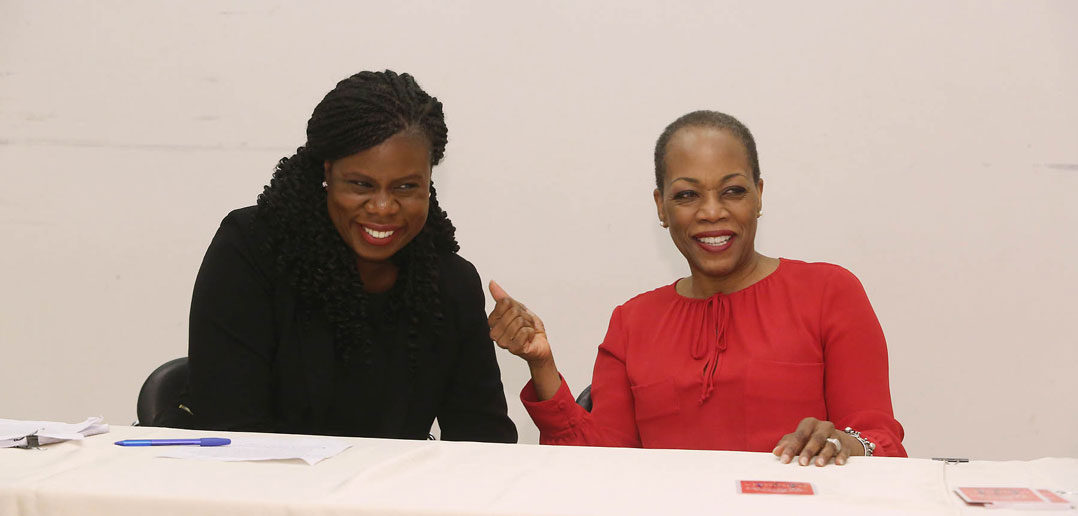On a Saturday afternoon, the stars of the Fordham theatre program’s upcoming play, Magnolia, gathered in Franny’s Space to rehearse Bob Dylan’s 1964 song, “The Times They Are A-Changin.’’”
But before they could throw themselves into the classic protest anthem, which opens the production, award-winning actress Regina Taylor—the play’s director and playwright— had a few guidelines.
“I want your total commitment to every moment,” said Taylor, who is the Denzel Washington Chair in Theatre. “Your total commitment is very important as we are piecing things together.”
Accompanied by the sounds of folksy guitar and ukulele riffs, the young actors clapped and stomped powerfully as they sang.
Some lyrics were as moving as they were prophetical: “There’s a battle outside/And it is ragin’/It’ll soon shake your windows/And rattle your walls/For the times they are a-changin’.”
For Taylor, the song sets the tone of Magnolia, which opens at Pope Auditorium on Oct. 5 and has performances on Oct. 6, Oct. 7, and Oct. 11 through Oct. 13.
She wrote Magnolia during the 2008 presidential election when Barack Obama made history as the first black president of the United States. It originally premiered at Chicago’s Goodman Theatre, where the Golden Globe winner, whose credits include I’ll Fly Away, Courage Under Fire, and Romeo and Juliet, has served as an artistic associate for 20 years.
A Season of Social Consciousness
Though set in 1963 Atlanta, Georgia and inspired by Russian playwright Anton Chekhov’s 1903 play, The Cherry Orchard, Taylor believes Magnolia challenges viewers to examine issues on race, gender, and class in today’s society. The play is part of Fordham Theatre’s mainstage season, What Does It Mean to Be an American?, and is one of many plays that Taylor is producing outside of the Fordham community this season that centers on resistance.

“It’s a privilege to be a writer in these times [and]sieve through the great changes happening right now to create work tied to social consciousness,” said Taylor.
While Magnolia’s main characters—Thomas, a black businessman and Lily, a white heiress— seem like they come from different walks of life, Taylor said they have more in common than you’d think.
Lily, played by Fordham College at Lincoln Center (FCLC) junior Addison Thompson, is a bohemian who was born on the Magnolia estate. She leaves Atlanta to escape the confines of being a white woman in the south 1963. When the matriarch of the family falls ill, Lily must return to confront her complicated legacy and try to save the estate from foreclosure.
Born on the same estate is Thomas, played by FCLC senior Eric Taylor. He now lives in segregated Atlanta Georgia in the affluent black neighborhood of Sweet Auburn.
Thomas vows to never return to Magnolia because of its memories. It is where his great grandparents were slaves and where his brother was lynched.
“He wants to chop down every one of those [magnolia]trees, and burn down the plantation where he came from,” said Taylor.
Getting at the Root
Taylor said the magnolia trees are symbolic because it also calls attention to the deeply layered and tainted soil that both Lily and Thomas come from.
She emphasized that the magnolia trees have a root ball intertwined with several shoots, which then bear trees of several hues.
Like the root balls, we are all joined sharing the struggles of freedom— both good and bad.
“Even as we try to chop, burn, or erase the awful parts of the past, we may not be able to dig up all the root balls,” she said. “They shoot back up in time. Each generation must wrestle with the past and the struggles of freedom and equality.”
[doptg id=”95″]
